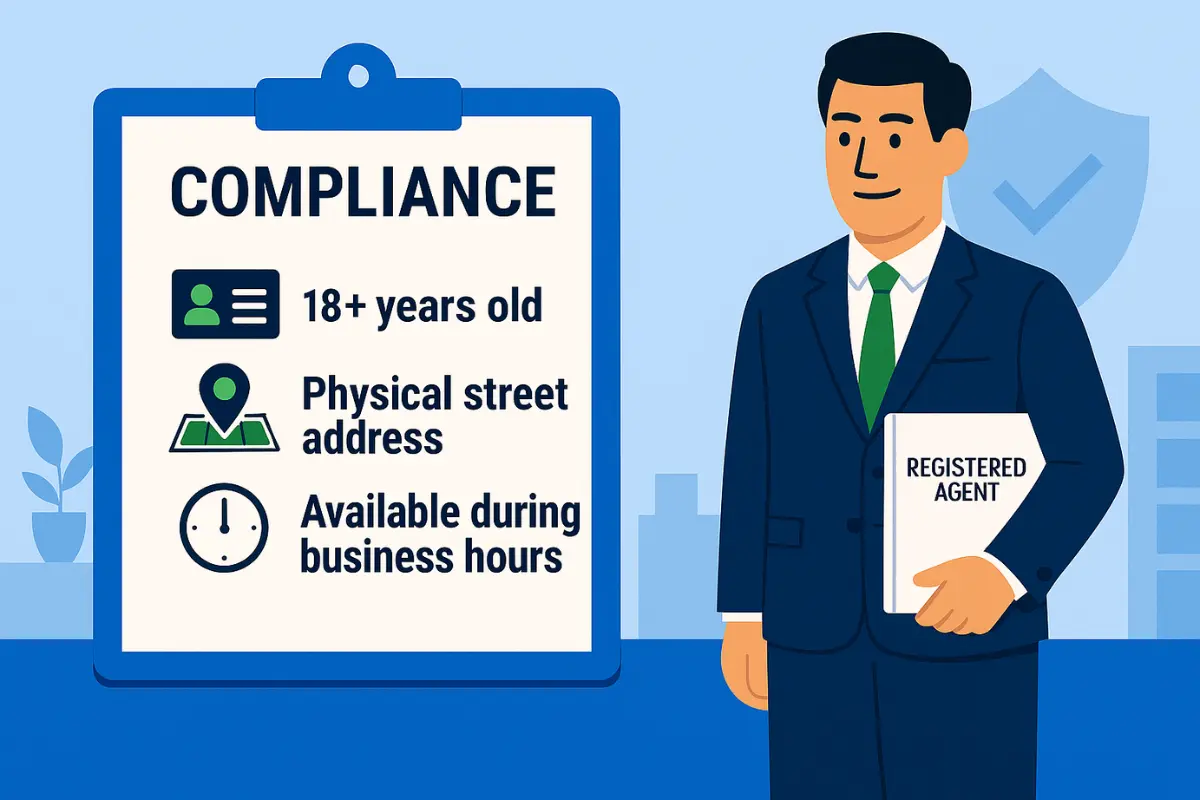Who Qualifies to Be a Registered Agent?

What if the person you appointed to receive legal documents for your business was deemed unqualified by the state, making your business subject to state penalties or risking that you miss important legal notifications, such as service of process? This isn't a theoretical risk. Every state has strict, non-negotiable criteria defining who can serve as your company's registered agent—the designated recipient of official legal and government correspondence. Appointing an ineligible agent isn't just an administrative error; it can result in penalties or default judgments if legal notifications are not received properly.
Understanding the qualifications to serve as a registered agent is not just a formality; it's essential for ensuring your business has a reliable, state-approved lifeline for its most important communications. Limited liability companies (LLCs) and corporations must comply with registered agent requirements to maintain their legal status. This guide breaks down the specific legal requirements, explains the risks of non-compliance, and provides a clear framework for verifying that your chosen agent—whether an individual or a professional service like InCorp—is fully qualified to represent your business.

Key Takeaways
-
Universal Mandate: All 50 states require a registered agent to have a physical street address (no P.O. boxes) within the state and be available during standard business hours.
-
Eligibility is Binary: An agent either meets all state-specific criteria or is legally unqualified; there is no middle ground.
-
Significant Risk: Appointing an unqualified agent can lead to missed lawsuits, default judgments, state penalties, and even the administrative dissolution of your business entity.
-
Verification is Key: Businesses must proactively verify their agent's eligibility upon appointment and periodically thereafter to prevent any issues.
-
Professional Advantage: A national professional service guarantees registered agent eligibility across all jurisdictions, eliminating the risk of missed legal notices or administrative issues caused by agent error or changing state rules.
The Critical Importance of a Qualified Registered Agent
A registered agent is more than a statutory formality; they are your business's first line of defense, ensuring you receive time-sensitive legal and official state documents promptly and can respond within mandated deadlines. Appointing an agent who fails to meet state qualifications undermines this notification system, exposing your business to severe and entirely avoidable risks. As noted in a comprehensive guide by Business.com, "the role of a registered agent is often underestimated, but it is a critical component of your business's legal compliance framework."
Legal Risks of an Unqualified Agent
An agent that fails to meet statutory requirements—such as maintaining a physical address in the state, being officially appointed, or maintaining required residency—cannot legally serve as your registered agent. Beyond statutory eligibility, practical issues can also compromise your legal protection: an agent who is unavailable during business hours or who mishandles documents after receipt creates different but equally serious risks.
The agent is responsible for receiving service of process and other legal notices, including critical documents such as subpoenas, garnishments, and court orders. Service must occur at the registered agent address on file with the Secretary of State, and courts require strict compliance with service of process requirements. If service cannot be completed at that address, it is not considered "served," and courts will typically pursue alternative service methods as required by statute. However, if your agent is statutorily disqualified or consistently unavailable, and service of process is completed through alternative service methods, are eventually exhausted or successful, you may never receive actual notice of legal proceedings. This can result in a default judgment against your company—meaning ityou automatically loses the case and could face wage garnishments, bank levies, or liens on business assets, all because improper agent selection or performance prevented your business from receiving timely notice of the lawsuit.
Administrative Consequences
Beyond lawsuits, an unreliable agent can cause your business to miss critical compliance notices, such as annual report reminders, from the business entity filing office (like the Secretary of State) or tax notices These delays can lead to the accidental lapses of business licensing, the rejection of important filings, and unnecessary fines for missed deadlines, creating a cascade of administrative problems.
Risk of Business Dissolution or Penalties
The state does not tolerate continual non-compliance. Failure to maintain a qualified registered agent is one of several grounds for administrative dissolution or revocation of corporate status. Even worse, without a reliable agent, compliance notices and critical reminders may be missed, resulting in unfiled documents that directly trigger administrative dissolution. This means the state legally shuts down your business entity, stripping away your limited liability protection for transactions made after dissolution and putting your personal assets at risk if your business continues to operate while dissolved.
Additionally, loss of good standing due to non-compliance can hinder obtaining business financing, as lenders and investors often require proof of good standing before providing funding.
Protection Through Professional Agents
This is why businesses partner with professional registered agents. These providers are, by design, always qualified. They offer a guaranteed physical address, professional availability, and usually systems to digitize and forward documents immediately. Many professional registered agents also offer additional business and filing services, including mail forwarding, virtual office options, annual reports , and compliance reminders, making business management more convenient. For companies operating in multiple states, choosing a national registered agent service is especially beneficial, as it helps ensure timely receipt of state notices and legal coverage across all jurisdictions. This reduces the risk of human error and missed notices, supporting continuous good standing and , allowing you to operate with peace of mind.
Legal Requirements for Registered Agents
The qualifications to be a registered agent are specific and leave little room for interpretation. While nuances exist between states, the core requirements are remarkably consistent across the U.S. The core requirements are:
-
An individual must be a legal adult (18+) and a resident of the state where the business is registered.
-
Both individuals and business entities must have a physical street address within the state—P.O. boxes or virtual offices are not permitted.
-
Availability at the registered office during regular business hours (usually 9 AM to 5 PM, Monday through Friday) is required to accept service of process and other legal documents.
-
Individuals must also be capable of responsibly handling legal documents and, in some states, must formally consent to appointment (such as California's written consent requirement).
-
Commercial agents must be legally authorized to conduct business in the state.
The registered office address is used for official legal and government correspondence, but may not always be the business's main operating address.
When forming a new business, the registered agent's name and address must be included in the business's formation documents, such as articles of organization or incorporation, to officially register the business with the state. It's the owner's responsibility to review state-specific rules, as some states require specific paperwork or additional steps to appoint or change the designated agent.

Physical Street Address Requirement
This is the most non-negotiable rule. The agent must have a physical street address within the state where the business is registered. This is often called the registered office, and the registered agent's address frequently serves as the official business address for receiving legal and government correspondence. P.O. boxes and virtual offices are explicitly prohibited because legal and state documents must be physically received in person.
Availability During Business Hours
The agent must be available at the registered office during regular business hours (typically 9 AM to 5 PM, Monday through Friday) to accept service of process in person. This rules out anyone with a full-time job elsewhere, who travels frequently, or who cannot be consistently present. Businesses often appoint a professional service to meet this obligation and avoid gaps due to absences or conflicting commitments.
State Residency or Authorization
For individuals: They must be a legal resident of the state and meet other eligibility criteria. For commercial registered agent service providers: The company must be authorized to conduct business within the state.
Compliance with State-Specific Rules
Some states have additional, unique rules. For example, in California, and a number of other states, the agent must consent to the appointment in writing before being listed on the Articles of Organization or incorporation. In states like New York and Pennsylvania, similar written consent is needed. Many states distinguish between commercial and noncommercial registered agents, with commercial agents being subject to special registrations. When filing formation documents, businesses are required to designate n registered agent, which is an essential statutory requirement. Additionally, some states require filing a separate agent form to appoint or change a registered agent. It is the business owner's responsibility to know and adhere to these specific state requirements.
How to Verify a Registered Agent's Qualifications
Assuming your agent is qualified is a dangerous gamble. Proactive verification is a simple yet critical step in safeguarding your business. As Forbes Advisor underscores, "selecting a registered agent is one of the most important early decisions you'll make for your business, and verifying their legitimacy is not just recommended—it's essential for your company's legal health."

Checking State Registration and Authorization
The most reliable method is to use your Secretary of State's online business database. You can often search for professional registered agent services to confirm they are in good standing and officially authorized to operate in the state. For individual agents, you can verify their status through the state's corporate filing system.
Reviewing Physical Address and Availability
Do not simply take an address on faith. Use mapping software to confirm it is a valid, physical location. For professional services, their consistent availability is a part of their core offering. For an individual, it is essential to confirm both physical location and daily availability through a clear agreement and a high level of confidence in their reliability.
Ensuring Legal and Operational Reliability
Ask pointed questions. How will they handle received documents? What is their process for notifying you? Do they have a backup plan? The agent must have a reliable process for forwarding documents to your business in a timely manner, as failing to deliver legal and government correspondence promptly can lead to penalties or legal issues. As Forbes Advisor highlights, the goal is to find a partner whose "process for handling legal documents is seamless and reliable," ensuring you never miss a critical filing.
Periodic Reverification and Updates
Qualification isn't permanent. A registered agent's address and eligibility must always be current with the Secretary of State or relevant state office. If your individual agent moves or becomes unavailable, the business owner is responsible for filing a change of address or appointing a new agent. When you use a professional registered agent service, they typically manage address changes on your behalf by promptly filing all necessary forms with the state for every entity they represent, which is a key benefit of working with a dedicated provider. Regularly review your registered agent's details—especially once a year or when filing your Annual Report—and ensure any updates are made immediately. This ensures you continue receiving important legal and government documents at the registered office listed with the state.
FAQs
Can a registered agent resign, and how is a replacement appointed?
Yes. A registered agent can resign by filing a formal statement of resignation with the Secretary of State or relevant state agency. The resignation usually becomes effective either when a new agent is appointed or after a set period—often 30 days from the filing date. Once the agent resigns, the business must appoint a new qualified registered agent as soon as possible and file the appropriate change form. Failing to do so can lead to loss of good standing, penalties, or administrative dissolution.
Can a business have different registered agents for multiple states?
Yes. When your business operates in more than one state, it must "foreign qualify" in each state where it conducts regular activities. Foreign qualification is the process of registering your company with the Secretary of State (or equivalent agency) outside your original home state, so your business can legally operate, hire employees, own property, or sign contracts there. As part of this registration, every state requires the appointment of a local registered agent to receive legal documents and official notices on your company's behalf. Businesses can use a different registered agent or provider in every state, or choose a single national service covering all jurisdictions. Each agent must meet that state's requirements—typically maintaining an in-state physical address and being available during business hours.
Are there fees associated with using a professional registered agent service?
Yes. Professional services typically charge an annual fee, which generally ranges from $130 to $300 per state. This fee covers the physical address, availability, and often includes additional services such as digital document scanning and compliance alerts.
Is it possible for a virtual office or coworking space to act as a registered agent?
Generally, no. Most states explicitly require a physical street address where a person is available to accept documents. While some coworking spaces may offer affiliated services, the space itself cannot typically serve as the agent.
Can one person act as a registered agent for multiple businesses?
Yes, a single individual or professional service can act as the registered agent for multiple businesses, provided they can reliably manage the flow of legal notices and documents for each entity and meet all state requirements.
Learn More About InCorp's Registered Agent Services
The stringent eligibility rules for registered agents exist for a reason: to protect businesses from catastrophic oversights. As we've outlined, appointing an unqualified agent—or failing to maintain one—isn't a simple error; it's a direct risk that can lead to missed lawsuits, default judgments, and the administrative dissolution of your business entity.
InCorp's expert team helps eliminate these risks. We provide more than just an address that meets state requirements; we deliver a foundation of reliability and expertise. Our professional registered agent service ensures your business receives all important legal notices, certain tax documents, and government correspondence on time. With over 25 years of experience and a presence in all 50 states, we serve as your trusted point of contact, safeguarding your privacy and your company's good standing.
Ready to ensure your business's first line of defense is unwavering? Partner with the experts who make complex compliance simple.
Focus on your business. Let InCorp handle the legal requirements. Start with InCorp's Registered Agent Services Today.
Share This Article:
Stay in the know!
Join our newsletter for special offers.